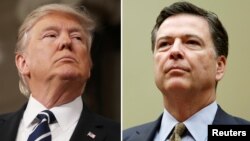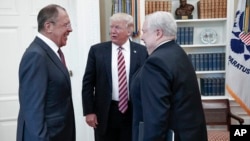Days before he was fired by Donald Trump, FBI Director James Comey requested more resources to pursue his investigation into Russia’s election meddling and the possible involvement of Trump associates, U.S. officials said Wednesday, fueling concerns that Trump was trying to undermine a probe that could threaten his presidency.
It was unclear whether word of the Comey request, put to deputy Attorney General Rod Rosenstein, ever made its way to Trump. But the revelation intensified the pressure on the White House from both political parties to explain the motives behind Comey’s stunning ouster.
Trump is the first president since Richard Nixon to fire a law enforcement official overseeing an investigation with ties to the White House. Democrats quickly accused Trump of using Comey’s handling of the Hillary Clinton email investigation as a pretext and called for a special prosecutor into the Russia probe. Republican leaders brushed off the idea as unnecessary.
Explanation changes
Defending the firing, White House officials said Trump’s confidence in Comey had been eroding for months. They suggested Trump was persuaded to take the step by Justice Department officials and a scathing memo, written by Rosenstein, criticizing the director’s role in the Clinton investigation.
“Frankly, he’d been considering letting Director Comey go since the day he was elected,” White House spokeswoman Sarah Huckabee Sanders said, a sharply different explanation from the day before, when officials put the emphasis on new Justice complaints about Comey.
Trump’s decision to oust Comey sparked comparisons to Nixon, who fired the special prosecutor running the Watergate investigation that ultimately led to his downfall. And Trump’s action left the fate of the Russia probe deeply uncertain.
The investigation has shadowed Trump from the outset of his presidency, though he’s denied any ties to Russia or knowledge of campaign coordination with Moscow.
Trump, in a letter to Comey dated Tuesday, contended that the director had told him “three times” that he was not personally under investigation. The White House refused Wednesday to provide any evidence or greater detail. Former FBI agents said such a statement by the director would be all but unthinkable.
Calls for independent investigation
Outraged Democrats called for an independent investigation into the Trump campaign’s possible ties to Russia’s election interference, and were backed by a handful of prominent Republican senators. But Senate Majority Leader Mitch McConnell, with the support of the White House, brushed aside those calls, saying a new investigation would only “impede the current work being done.”
The Senate intelligence committee Wednesday subpoenaed former Trump national security adviser Michael Flynn for documents related to its investigation into Russia’s election meddling. Flynn’s Russia ties are also being scrutinized by the FBI.
The White House appeared caught off guard by the intense response to Comey’s firing, given that the FBI director had become a pariah among Democrats for his role in the Clinton investigation. In defending the decision, officials leaned heavily on a memo from Rosenstein, the deputy attorney general, that criticized Comey’s handling of the Clinton investigation.
But Rosenstein’s own role in Comey’s firing became increasingly murky Wednesday.
Three U.S. officials said Comey recently asked Rosenstein for more manpower to help with the Russia investigation. Sen. Dick Durbin, D-Ill., said that while he couldn’t be certain the request triggered Comey’s dismissal, he said he believed the FBI “was breathing down the neck of the Trump campaign and their operatives and this was an effort to slow down the investigation.”
Justice Department spokeswoman Sarah Isgur Flores denied that Comey had asked Rosenstein for more resources for the Russia investigation.
White House meeting
Trump advisers said the president met with Rosenstein, as well as Attorney General Jeff Sessions, Monday after learning they were at the White House for other meetings. One official said Trump asked Rosenstein and Sessions for their views on Comey, then asked the deputy attorney general to synthesize his thoughts in a memo.
The president fired Comey the following day. The White House informed Comey by sending him an email with several documents, including Rosenstein’s memo.
It’s unclear whether Rosenstein was aware his report would be used to justify the director’s ouster.
White House and other U.S. officials insisted on anonymity to disclose private conversations.
The president relied largely on Twitter to defend his actions. In a series of morning tweets, he said both Democrats and Republicans “will be thanking me.”
In an awkward twist of timing, the only event on the president’s public schedule was a meeting with Russian Foreign Minister Sergey Lavrov in the Oval Office. Among those participating in the meeting were Russian Ambassador to the U.S. Sergey Kislyak, whose contacts with Trump advisers are being scrutinized by the FBI, and Henry Kissinger, who served as Nixon’s secretary of state.
In brief remarks to reporters, Trump said he fired Comey because “he wasn’t doing a good job. Very simply. He was not doing a good job.”
Trump’s assessment marked a striking shift. As a candidate, he cheered Comey’s tough stance on Clinton’s use of a personal email and private internet server during her tenure as secretary of state. He also applauded the director’s controversial decision to alert Congress of potential new evidence in the case 10 days before the election — an announcement Clinton and other Democrats blame in part for election results that put Trump in the White House.
Sanders attributed Trump’s shift to the difference between being a candidate and president. She said Trump became concerned about Comey’s efforts to work outside the Justice Department’s chain of command during the Clinton investigation, citing congressional testimony from last week that provided more details of his actions last year.
Yet as recently as last week, White House Press Secretary Sean Spicer said Trump had “confidence” in Comey.
Comey farewell letter
Meanwhile, a farewell letter from Comey that circulated among friends and colleagues said he does not plan to dwell on the decision to fire him or on “the way it was executed.”
He said in the letter that though he’ll be fine, he will miss the FBI and its mission “deeply.” Comey said that “in times of turbulence, the American people should see the FBI as a rock of competence, honesty, and independence.”
He also said “it’s very hard to leave a group of people who are committed only to doing the right thing.”
The letter was posted online by CNN Wednesday night. A person who had seen the note confirmed the online version as authentic to the AP.
Trump is only the second president to fire an FBI director, underscoring the highly unusual nature of his decision. President Bill Clinton dismissed William Sessions amid allegations of ethical lapses in 1993.
The White House said the Justice Department was interviewing candidates to serve as interim FBI director while Trump weighs a permanent replacement. Sanders said the White House would “encourage” the next FBI chief to complete the Russia investigation.
“Nobody wants this to be finished and completed more than us,” she said.





